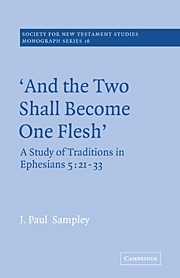Book contents
- Frontmatter
- Contents
- Dedication
- Preface
- Acknowledgments
- I Introduction of problem and perspective
- II Outline of the epistle to the Ephesians and the author's knowledge of his readers
- III Identification and study of traditional materials in 5: 21–33
- IV Three passages from the homologoumena especially related to 5: 21–33
- V Hermeneutical problems in 5: 31–2
- VI The movement of thought in 5: 21–33
- VII Detailed analysis of 5: 21–33
- VIII Concluding observations
- Bibliography
- Indexes (passages cited, authors, subjects, selected Greek words)
VIII - Concluding observations
Published online by Cambridge University Press: 29 September 2009
- Frontmatter
- Contents
- Dedication
- Preface
- Acknowledgments
- I Introduction of problem and perspective
- II Outline of the epistle to the Ephesians and the author's knowledge of his readers
- III Identification and study of traditional materials in 5: 21–33
- IV Three passages from the homologoumena especially related to 5: 21–33
- V Hermeneutical problems in 5: 31–2
- VI The movement of thought in 5: 21–33
- VII Detailed analysis of 5: 21–33
- VIII Concluding observations
- Bibliography
- Indexes (passages cited, authors, subjects, selected Greek words)
Summary
The stage is now set for the consideration of further questions relating to 5: 21–33 and the importance of this passage in the epistle to the Ephesians. There are certain isolable concerns to which the study now turns.
A. IMPLICATIONS OF 5 : 21–33 FOR THE REMAINDER OF THE HAUSTAFEL
This investigation has thus far focused on the first set of relationships in the Haustafel (5: 21–33) and has reserved comment upon 6: 1–9, the remainder of the form. Whereas thirteen verses are devoted to wives and husbands (5: 21–33), a total of nine verses is allotted to the remaining classes in the Ephesian Haustafel (6: 1–9).
It has been determined above that 5: 21 not only bears a special relationship to 5: 22 ff. but is, in fact, an introduction to the entire Haustafel. ‘Be subject to one another out of reverence for Christ.’ Though the Ephesian Haustafel insists that the wives, children and slaves be obedient or submissive to their counterparts, the subjection is placed in somewhat different perspective by the superscription to the Haustafel. The phrase, ‘Be subject to one another’, is directed to all members of the household, even though the author's inherited Haustafel form does not suggest any such mutuality. 5: 21 states very succinctly the interdependence of the believers. The remainder of v. 21, ‘out of reverence for Christ’, points to the governing factor for all Christians; all believers are incorporated into Christ and are governed by this commitment.
- Type
- Chapter
- Information
- 'And The Two Shall Become One Flesh'A Study of Traditions in Ephesians 5: 21-33, pp. 148 - 163Publisher: Cambridge University PressPrint publication year: 1971

